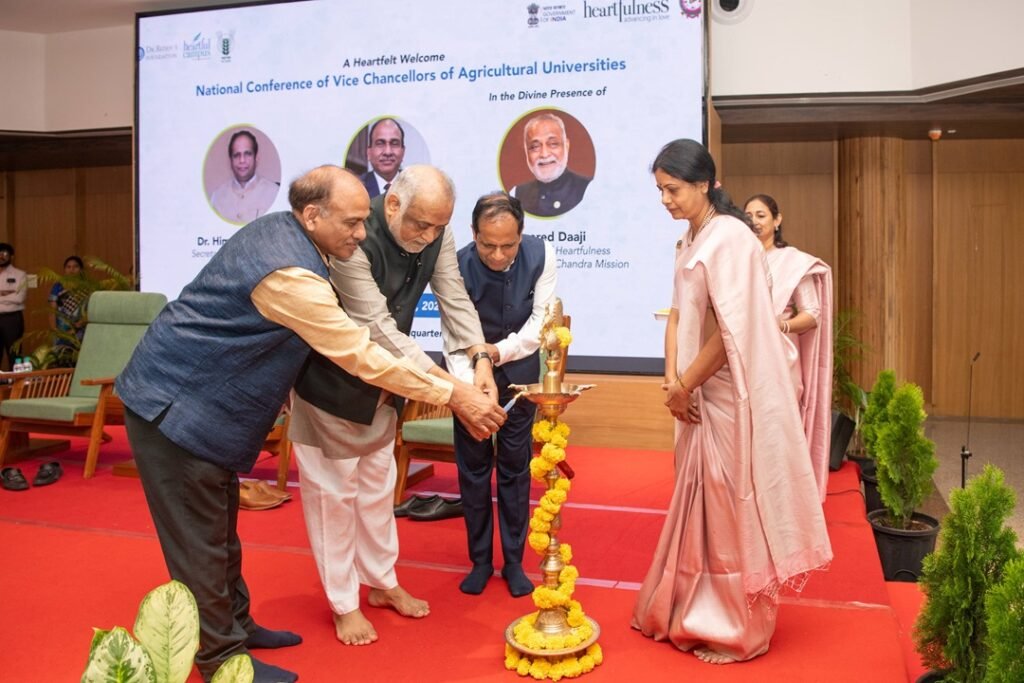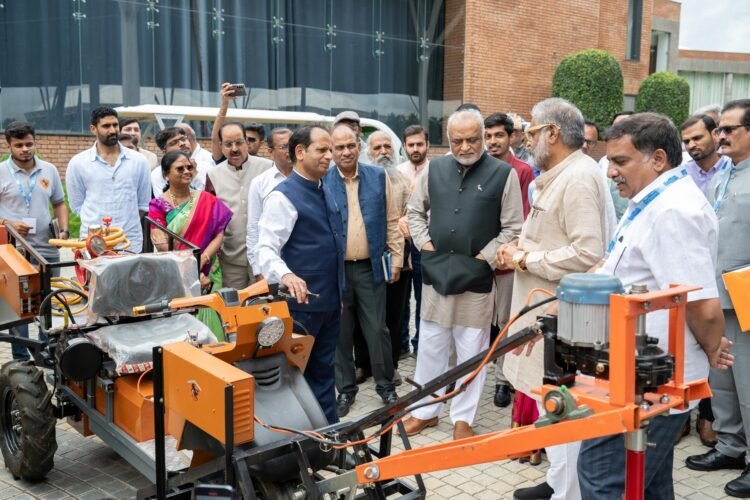The event featured 62 vice-chancellors and 11 senior officials and scientists from ICAR, with a focus on reshaping agricultural education in India.
HYDERABAD (India CSR): Heartfulness in association with the Govt. of India, Indian Council for Agricultural Research, Dr. Reddy’s Foundation, Sri Konda Laxman Telangana State Horticulture University inaugurated a two-day National Conference of Vice Chancellors of Agricultural Universities at Kanha Shanti Vanam – the headquarters of Heartfulness in the outskirts of Hyderabad. The forum was presided over by Dr. Himanshu Pathak – Secretary, DARE & Director General ICAR and Dr. R.C. Agrawal – Deputy Director General, Agricultural Education ICAR in the Divine Presence of Rev. Daaji – Guide of Heartfulness and President of Shri Ram Chandra Mission.
62 vice chancellors and 11 senior officers and scientists from ICAR participated in the event.
Dr. R.C. Agrawal’s Vision for Agricultural Education and Youth Training
Dr. R. C. Agrawal – Deputy Director General (Agriculture Education) ICAR in his address said, “I am thankful to Rev. Daaji for signing the MoU with ICAR. With support of his volunteers for offering Heartfulness meditation to our students, there is a lot of change in terms of concentration, focus, output of the students and our teachers. The latest statistics suggest that 2% youth in vocational training, 93% unorganised work sectors. We need to have a roadmap on how we can train the youth for the next five years and the best way to provide certificate programmes, visit to ICAR institutes, double the intake at agri universities (growing from the existing 10% increase in the numbers of agri seats) and to identify and overcome the constraints for implementation on plan. We want to discuss the guidelines of PPP from valuable inputs of our Vice Chancellors, reformulate and restructure policy for internships and work, discuss the salient features of Dean’s committee.”
Dr. Himanshu Pathak’s Call for Viksit Bharat Through Viksit Krishi
Dr. Himanshu Pathak – Secretary, DARE & Director General ICAR in his keynote address said, “Agriculture, nature, progress and peace are interlinked. Viksit Bharat will come with Viksit Krishi and Viksit Krishni will stem from Viksit Shikha. Without this you cannot increase productivity and profitability and sustainability of agriculture. While discussing the education system of ICAR we must remember that Indian agriculture must be friendly on 5 grounds: 1. Nature-friendly 2. Technology-friendly 3. Market-friendly to identify what farmers and markets need and what other countries need for sustainability and profitability 4. Gender friendly 5. Agri must be culture-friendly. Agri is also our heritage. Change will come from agricultural universities and NGOs as Heartfulness. My humble gratitude to Rev. Daaji.”
Rev. Daaji’s Call for Integrating Spirituality in Agriculture
Rev. Daaji – Guide of Heartfulness and President of Shri Ram Chandra Mission said, “My special thanks to Shivraj Singh Chouhan ji who could not be here today and to our hon’ble guests. Without agriculture, there is no life. The role of universities is to make agriculture more ‘sakshritik’ with less efforts, high production, more efficiency. Over the years I have been watching what is happening to the upper crust of our earth which contains nutrients. Spraying microdose of sea-water on crops can work wonders. Make agriculture fascinating and interesting. Meditation has a positive impact on farms with increase in productivity. Students can also be taught how lovingly you can play with seeds worshipfully. Before planting there used to be rituals. That culture has to be brought back. Material life and spiritual life have to go together. Please add spiritual component to agri, teach farmers to be more reverential, grains will have positive impact, thoughts will also change when we partake of that food.”

Meditation and Job Opportunities Discussed at the Event
Rev. Daaji led a group meditation session followed by his address. The event also witnessed a discussion on the Job Opportunities for Agri-students (Dr S K Sharma, ADG, HRM and Bimlesh Mann, ADG, EP& HS) as part of the ICAR initiative. This was followed by a visit to Water Harvesting Site and Nursery and on-site discussion with Heartfulness Institute regarding prospects for water harvesting by agricultural universities. A presentation by RRF team (regional facilitators, state in-charge representatives of Heartfulness all over India and representatives of universities and Heartful campus programs team) followed this visit.
Day 2 Panel Discussions and Highlights
The Day 2 of the conference is slated to host a panel discussion on public-private partnership in higher agricultural education with Dr. S K Sharma, ADG, HRM; discussion on the 6th Deans Reports by Dr. A S Yada, ADG, EQ&R; discussion on Dual degree in higher agricultural education by Dr Bimlesh Mann, ADG, EP& HS; an interaction of Vice Chancellors and ICAR staff with the Heartfulness institute and volunteers regarding the agriculture initiatives to be followed by a tour to the state-of-the-art Tissue Culture lab housed at Kanha and a closing ceremony with a musical cultural programme.
Focus on Well-Being and Agricultural Collaboration Through MoU
The conference was centered around enhancing the well-being of individuals in the agricultural sector, particularly farmers and agricultural scientists through an existing Memorandum of Understanding (MoU) between ICAR and Heartfulness. The MoU comprises integrating meditation, wellness, and holistic practices into the lives of farmers and professionals working in agriculture.
Heartfulness Meditation’s Growing Impact on Agricultural Students
Over 10,000+ students have begun practicing Heartfulness Meditation, with more than 100 events conducted in agricultural colleges across India. Additionally, 5 Agro youth seminars have been organized at Kanha Shanti Vanam, and 8 internships have been offered to agricultural students for various Agro initiatives. Mental Health Support, Capacity Building and Training; Promoting Sustainable Practices; Research Collaboration are the core objectives being achieved through the ICAR-Heartfulness MoU. This collaboration signifies a unique blend of modern agricultural science and ancient wellness practices, aimed at uplifting the overall well-being of the agricultural community in India.
About Heartfulness and Its Global Mission
About Heartfulness: Heartfulness offers a simple set of meditative practices and lifestyle changes, first developed at the turn of the twentieth century and formalized into teaching through the Shri Ram Chandra Mission in 1945 in India with a goal to bring peace, happiness, and wisdom to one heart at a time. These practices are a modern form of Yoga designed to support contentment, inner calm, and stillness, compassion, courage, and clarity of thought, as the first step towards a purposeful life. They are simple and easily adopted and are appropriate for people from all walks of life, cultures, religious beliefs, and economic situations, who are over the age of fifteen. Ongoing training in Heartfulness practices continues at thousands of schools and colleges, and over 100,000 professionals are meditating in corporations, non-governmental, and government bodies worldwide. More than 5,000 Heartfulness Centers are supported by many thousands of certified volunteer trainers and millions of practitioners in 160 countries.
=============================================================
Top 10 Important Outcomes of the National Conference of Vice Chancellors of Agricultural Universities
Key takeaways from the discussions at the two-day conference on reshaping agricultural education in India.
The two-day National Conference of Vice Chancellors of Agricultural Universities held at the Heartfulness Headquarters in Hyderabad brought together key stakeholders from the agricultural education sector. This significant event laid a revolutionary roadmap for transforming agricultural education in India. Below are the top 10 important outcomes from the talks and discussions during the conference.
1. Roadmap for Youth Training in Agriculture
One of the central themes of the conference was creating a structured roadmap to train youth in the agricultural sector over the next five years. The discussions emphasized the importance of vocational training, increasing the intake of agricultural university seats, and offering certificate programs. Vice Chancellors were encouraged to identify constraints and create strategies for successful implementation.
2. Expansion of Agricultural University Seats
The need to expand capacity in agricultural universities was a critical outcome. Dr. R. C. Agrawal highlighted that the current intake of students in these institutions needs to double, ensuring more youth are trained to meet the growing demands of the agricultural sector. Increasing seats by 10% annually was discussed as a key solution.
3. Focus on Public-Private Partnerships (PPP)
Public-private partnerships (PPP) in agricultural education were discussed as a key strategy to bring in industry expertise and financial support for universities. A framework for developing PPP guidelines was proposed, with inputs from Vice Chancellors and other key stakeholders.
4. Integration of Heartfulness Meditation into Agriculture Education
One unique aspect of the conference was the agreement to integrate Heartfulness meditation into the curriculum of agricultural universities. The collaboration aims to improve students’ concentration, focus, and overall productivity. The positive effects of meditation on farming and personal well-being were also emphasized.
5. Emphasis on Sustainable Agricultural Practices
Sustainability was a recurring theme, with a focus on making Indian agriculture more nature-friendly, technology-friendly, and market-friendly. Dr. Himanshu Pathak stressed that the agricultural sector must align itself with global sustainability standards while maintaining cultural heritage.
6. Job Opportunities for Agricultural Graduates
The conference addressed the employment prospects of students graduating from agricultural universities. Discussions focused on the need to reformulate internship and work policies, along with offering students real-world exposure to ICAR institutes and agri-business sectors.
7. Research Collaboration Between ICAR and Universities
Enhanced research collaboration between ICAR and agricultural universities emerged as a key outcome. The focus will be on practical research initiatives that address current agricultural challenges and promote innovation in farming techniques, technology, and sustainable practices.
8. Enhancing Mental Health Support in Agriculture Education
Mental health support for students and professionals in agriculture was highlighted through the integration of meditation and wellness practices. The MoU between ICAR and Heartfulness was seen as a crucial step towards building a more holistic education system that addresses mental well-being alongside technical knowledge.
9. Discussion on Gender and Cultural Sensitivity in Agriculture
Gender-friendly and culture-friendly approaches to agriculture were discussed as essential elements in creating a more inclusive agricultural system. The focus was on empowering women in agriculture and preserving India’s rich agricultural heritage through education.
10. Exploring Dual Degree Programs in Agriculture
A proposal for introducing dual degree programs in agricultural education was another important outcome. These programs will allow students to gain expertise in multiple fields, preparing them for diverse roles in the agricultural sector and fostering a multidisciplinary approach to problem-solving.
(Copyright@IndiaCSR)







